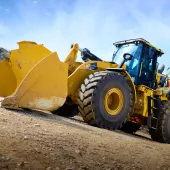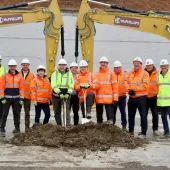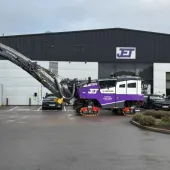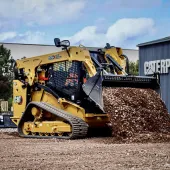Better-equipped Planing and Paving Machines Maximize Productivity

First published in the January 2021 issue of Quarry Management as Paving the way to Sustainability
Jonathan Davies, paving industry manager at Finning UK and Ireland, explores how better-equipped planing and paving machines can help maximize productivity, while maintaining safe and sustainable operations
In May 2020, the Government announced a £2 billion investment package to establish cycling and walking lanes on the streets of the UK’s busy towns and cities, much like those you see in Amsterdam. As local authorities typically employ pavers to alter road layouts to encourage commuters to walk or cycle to work, this initiative opens many opportunities for the paving industry.
As well as the investments in cycle and pedestrian lanes to reduce urban traffic, the Government has also announced grants of up to £27 billion to upgrade the UK’s busiest roads by 2025. With the potential to create 64,000 construction jobs, the paving industry will be looking to new technology to advance its asphalt paving systems.
Paving systems have already evolved to accommodate more sustainable practice. Micro-surfacing now involves laying high-quality aggregates combined with polymer-modified bitumen emulsion to repair roads. Although this improved recipe reduces the amount of hazardous fumes released into the atmosphere, it does not eliminate them altogether. However, technology is in place to reduce environmental impact further.
It is optimistic to say that encouraging cycling and walking in cities will counteract the environmental impact of the paving sector. Companies must equip themselves with sustainable machinery to carry out clean operations. The latest asphalt pavers have an advanced eco-mode setting that modifies engine speed based on load conditions. This cuts fuel burn by 5% and maximizes the performance of the machine.
With 10% of global carbon emissions stemming from the construction industry, the environmental impact of the paving sector is one area that represents a significant opportunity for improvement. It is estimated that one standard asphalt paver produces 170.3kg of CO2 per full tank of diesel. To tackle this head on, electric Cat vehicles – notably tractors in the agricultural sector – are being trialled to see whether performance can match the ecological benefits. To this end, the paving industry may soon be benefiting from electric vehicle operations, rather than diesel-fuelled engines.
Much of the Cat Stage V range is used by paving companies because the equipment reduces emissions by 25%, while maintaining productivity. A fleet of Cat PM620s planers were used on a paving project in northern England in 2018 and were praised for their consistency in approach. The manoeuvrability and precision in extraction and planing gave way to productive operations, with all work completed quickly and efficiently.
A big consideration for the paving sector is finding adaptable, low-intervention solutions that will be completed quickly to avoid unnecessary disruption to the public. Ultimately, this is achieved by having a good product support infrastructure from suppliers — one that will extend the life of their machinery and reduce resource input. There is also the option of buying used machines. Used pavers, planers and compactors are serviced and maintained so that the benefits of the ecological Caterpillar technology can be experienced by the next user.
Purchasing used equipment, therefore, should not be a concern for the paving sector. Certified and warrantied machines allow for repairs to be done efficiently so that paving may continue at no time cost to the construction workers. Cat cutter bits from a used cold planer still last 80% longer than conventional carbide cutter bits to provide greater production, at 15% decreased fuel consumption. Although using a cold planer would still have some negative environmental considerations, reducing impact to the minimum should be a priority.
Pavement milling requires a substantial amount of control and precision to leave behind a clean milled surface for pedestrians and cyclists. This is achieved through reliable rotor drive systems that optimize engine speed to peak torque function all through the cutting process. When cutting gets difficult, a reliable rotor drive system gives consistency across a project as well as maximized performance capabilities.
Considering current health pressures, government investment will hopefully increase the fitness of the population following coronavirus. Cyclists and walkers should feel safer travelling in designated lanes, and reduced congestion will make built-up areas more accessible for the emergency services. Moreover, by encouraging energy-efficient travel, we can help reduce the country’s carbon emissions.
For more information visit: www.finning.com
- Subscribe to Quarry Management, the monthly journal for the mineral products industry, to read articles before they appear on Agg-Net.com








